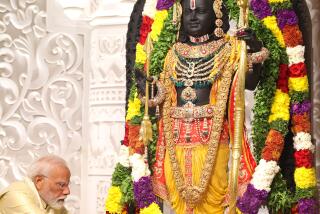P.V. Narasimha Rao, 83; Reformed India’s Economy
- Share via
NEW DELHI — Former Prime Minister P.V. Narasimha Rao, whose free-market economic reforms in 1991 launched India’s shift from a bankrupt nation hobbled by socialist policies into a regional economic power, has died. He was 83.
Rao died Thursday of cardiac arrest at the All India Institute of Medical Sciences, where he was admitted Dec. 9 after complaining of shortness of breath, said Chetan Sharma, his aide.
“It’s a personal loss to me,” said Prime Minister Manmohan Singh, who was once Rao’s finance minister and his right-hand man in the reform campaign. “He will be remembered as the father of economic reforms.”
Rao’s career was overshadowed by accusations that he did little to curb the savage religious violence that tore through India during his 1991-96 term, and by corruption charges made against him late in life.
He was also the first prime minister to be tried on criminal charges while out of office.
In 2001, Rao was sentenced to three years in prison for buying lawmakers’ support to save his government from falling during a 1993 no-confidence motion. The conviction was overturned the next year and Rao never served any time in prison.
Rao was a lifelong loyalist of the Nehru-Gandhi political dynasty, which produced India’s first prime minister, Jawaharlal Nehru, his daughter Indira Gandhi and her son Rajiv Gandhi, both of whom became prime minister. Gandhi’s wife, Sonia, is now the head of the governing Congress Party.
Rao was brought out of retirement to head the Congress Party after the 1991 assassination of Rajiv Gandhi and was swept into the prime minister’s office.
He cemented his role in the country’s modern history by initiating a series of economic reforms drafted by Singh, a Cambridge-educated economist.
By slashing subsidies, launching the partial privatization of state-run companies and inviting foreign investors, the two men wrought a financial revolution in a nation where Soviet-style economic policies had long held sway.
They also dismantled what was known as the “license raj,” the vast, complex system of regulations that forced businesses to get government approval for nearly any decision -- often with enormous bribes.
Rao’s tenure was marred by the 1992 destruction of the Babri mosque by mobs of Hindu nationalists in the northern town of Ayodhya. The destruction set off nationwide Hindu-Muslim riots that left more than 2,000 people dead. Many blamed Rao’s inaction for the bloodshed.
The mosque tragedy and a Hindu nationalist campaign weakened Congress beyond repair. In 1996 -- after ruling India for all but four of the previous 49 years since independence -- the party fell from power.
Rao was born into an upper-caste Brahmin farming family June 28, 1921, in the southern state of Andhra Pradesh and launched his political career when he was still in law school, joining protests against British colonialists.
At 36, he won a seat in the Andhra Pradesh state assembly and entered national politics in 1977 as a member of India’s Parliament. He held a number of top posts from 1980 to 1989, including foreign minister and defense minister.
Rao is survived by three sons and five daughters.
More to Read
Sign up for Essential California
The most important California stories and recommendations in your inbox every morning.
You may occasionally receive promotional content from the Los Angeles Times.













